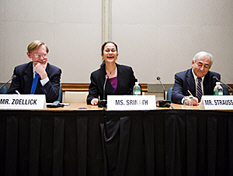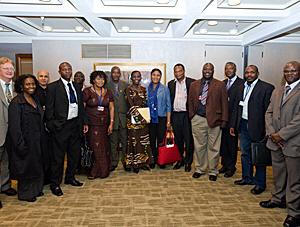The IMF and Civil Society

World Bank President Robert Zoellick, Ingrid Srinath, Secretary General of CIVICUS, and IMF Managing Director Dominique Strauss-Kahn at the 2008 CSO Townhall Meeting
Civil Society Engagement at the 2008 Annual Meetings
October 23, 2008
The 2008 IMF/World Bank Annual Meetings, held in the midst of an unprecedented global financial crisis, were attended by more than 350 representatives of civil society organizations (CSOs) from over 50 countries attendedrecord attendance for any Annual Meeting held in Washington or abroad.
Civil Society Policy Forum
Fund staff participated in many of the over 30 dialogue sessions of the IMF/World Bank Civil Society Policy Forum between October 9 and 13. Among the highlights of the Policy Forum:
- The sixth annual CSO Townhall Meeting with the heads of the IMF and World Bank was the first Townhall Meeting for IMF Managing Director Dominique Strauss-Kahn. He told CSOs that low-income countries could be dramatically affected by the financial crisis, adding that "we all need to push developed countries to go on with the aid they have committed to provide."
- Another major event was a half-day workshop on the global food crisis, co-sponsored by InterAction, the IMF and the World Bank. It included reports on the Bank and Fund's analysis of and response to the crisis, and civil society analyses of the impact of high food prices in Latin American countries, Malawi and India, and the impact on small farmers. Patricia Alonso-Gamo of the IMF's Strategy, Policy and Review Department (SPR), presented the Fund's work.
- Calvin McDonald of the IMF African Department (AFR) and Brett House of the UN Development Program (UNDP) jointly organized a session on the UN Millennium Development Goals Africa Steering Group and work being done by the IMF with input by UNDP, the World Bank and the African Development Bank on macroeconomic assessments of "Gleneagles aid scaling-up scenarios" in 10 African countries. The first study of three country case studies (Benin, Niger, and Togo) was recently published.
- In an IMF session on the Sub-Saharan Africa Regional Economic Outlook (REO) AFR's Andy Berg, Hans Weisfeld, and Paolo Drummond discussed how the region is faring in the face of higher food and oil prices and global economic turmoil. The REO analyzed economic performance and short-term prospects of 44 countries and provided analysis of Africa's growth takeoff since the mid-1990s.
- SPR's Jan Kees Martijn and AFR's Dan Ghura participated in a session organized by the African Forum & Network on Debt & Development (AFRODAD) on the Poverty Reduction and Growth Facility (PRGF)/Policy Support Instrument (PSI), Fiscal Space and Financing for Development. AFRODAD presented the findings and recommendations from five country case studies (Cameroon, Malawi, Mozambique, Rwanda, and Uganda) noting both positive and negative experiences with the PRGF and the PSI.
- Martijn and his SPR colleague Paolo Dudine also jointly presented a recent IMF working paper on the spending and absorption of aid in PRGF-supported programs. The use of aid by low-income countries, and its treatment in programs supported by the IMF, has received considerable attention in recent years, including in a study from the IMF's Independent Evaluation Office that found some evidence that PRGF-supported programs may limit the full use of aid. The new IMF working paper analyzes this issue using a new database of all such programs during 1999-2007 and finds that PRGF-supported programs allow countries to use most or almost all increases in aid within a few years. It finds some evidence that the programmed absorption of aid is higher in countries where reserve coverage is above a certain threshold, whereas programmed spending does not seem to depend on inflation. It also shows that the presence of a PRGF-supported program does not constrain the actual spending and absorption of aid.
CSO Sponsorship Program

Sponsored CSOs: IMF African Department Director Antoniette Sayeh with a group of African sponsored CSO representatives at a reception on October 9, 2008 .
To ensure that the views of developing countries are more fully represented at the Annual Meetings, over 25 CSOs and 25 journalists from developing countries were sponsored to attend the meetings. Funding was provided by bilateral donors (Japan, Norway, and U.K.), and the Bank and Fund. Among the Fund and Bank events organized for the sponsored CSOs were a meeting with the Fund's African Executive Directors; a reception with the new AFR Director, Antoinette Sayeh; a meeting with the Bank's Vice President for the Africa Region, Obiageli Ezekwesili; and several meetings with IMF mission chiefs.
Newcomers to the Annual Meetings
For the first time the Bank and the Fund made an effort to specifically involve heads of CSOs in the Annual Meetings. About 30 CSO leaders met for a breakfast with senior Fund and Bank staff, including Bank President Zoellick. The breakfast was hosted by IMF External Relations Director Masood Ahmed and World Bank Acting Senior Vice Present for External Affairs Edith Grace Ssempala.
Several CSO executives spoke on Program of Seminars panels, which focused on the food and fuel as well as the financial crisis. The attendance of CSO leaders helped further raise the profile of civil society activities at the Annual Meetings. At a feedback session at the end of the Meetings, CSOs themselves called for the high-level attendance at Annual Meetings to be institutionalized to ensure enhanced dialogue and effective follow-up on recommendations.
In addition, for the first time, youth leaders from developing countries were invited to attend. The 18 youth leaders previously had participated in World Bank youth programs in 14 countries. They were treated to a special "Youth@Annual Meetings" program, organized by the World Bank. They also participated in Civil Society Policy Forum sessions, bringing new perspectives to the discussions.
It was noteworthy that for the first time, a delegation of the European Parliament's Committee for Economic and Monetary Affairs, headed by Chair Pervenche Beres of France attended the Annual Meetings. The delegation met with senior staff of the IMF's External Relations, European, and Monetary and Capital Markets Department to get an update of the financial crisis and its global repercussions.
